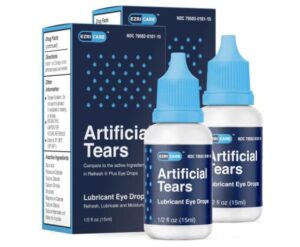 “Pseudomonas aeruginosa” is a name that has been making headlines this February, with the shocking announcement of the voluntary recall of EzriCare Artificial Tears eye drops by Global Pharma Healthcare. The name refers to the bacterial enzyme which has contaminated the eye drops, raising alarm bells as it has injured and even killed eyedrop users. Five people have reportedly lost their vision completely and one person, their life, as a result of the tainted product.
“Pseudomonas aeruginosa” is a name that has been making headlines this February, with the shocking announcement of the voluntary recall of EzriCare Artificial Tears eye drops by Global Pharma Healthcare. The name refers to the bacterial enzyme which has contaminated the eye drops, raising alarm bells as it has injured and even killed eyedrop users. Five people have reportedly lost their vision completely and one person, their life, as a result of the tainted product.
Over 55 injuries have been reported, but as we know from the product liability world, these types of injuries are usually vastly underreported.
The symptoms of those directly impacted by the eye drops are as startling as they are unusual. Not only do they include eye-related symptoms such as swollen corneas, but other presentations, such as endophthalmitis, respiratory infection, keratitis, urinary tract infection, and sepsis have also occurred.
The question many have asked is how a simple eye drop product can cause infections in the blood and lungs, and even death?
In an article on the Washington man who died as a result of using the eye drops, Dr Evie Lawson, optometrist at Eyes on You in Seattle, is quoted saying: “Patients have been coming and going, ‘What the heck? How is it possible that an eye drop could kill somebody?'”
The answer to this lies in the connection the eye has to the nasal cavity. The eyes are connected by tear ducts to the nasal cavity, allowing bacteria to move into the lungs, once they have entered into the cavity through the tear ducts. This can then cause infections in other areas of the body, such as the bloodstream.
This is allegedly the reason for the death of the Washington man, whose untimely passing made news headlines, and stirred many to ask, “How could this have happened?”
These incidents emphasize the need for manufacturers to check, and check again, when selling anything which will be used in the eyes — or anywhere in the body, for that matter.
Other eye-related products have also been recalled as a result of pseudomonas aeruginosa.
Reports on Condalab call pseudomonas aeruginosa the main culprit for cosmetic recalls, and give statistics which highlight the extent of pseudomonas aeruginosa-related recalls.
The report say the bacterial enzyme has a “worrying mortality rate.” A recent article on the site says that, over a three-year period, in the EU alone, as many as 173 cosmetics were recalled. Of these, 24 were recalled as a result of being contaminated by the bacterial enzyme. Then, of those recalled on suspicion of containing pseudomonas aeruginosa, a high percentage of 40 percent carried the actual bacteria.
That’s a high percentage and a concerning statistic. What’s more concerning is that, in the United States, products labeled as “cosmetic,” which includes non-medical eyedrops, lotions, hair products, and facial cosmetics, are not seriously regulated. Without realizing it, many Americans are counting on companies to regulate themselves. When they don’t, lawsuits are the only way to hold them accountable and to create safer products for everyone.
Ezricare, which markets artificial tears in the US, has stopped distributing the product in the U.S. Also, much advice has been given for those using eye drops, to never let the actual dropper touch the eye when using the product. There is speculation that faults in the design of the packaging of products are one of the reasons for the products being affected. The bacterial enzyme allegedly breeds on the application containers.
One has to ask whether pseudomonas aeruginosa is really the main culprit in cosmetic recalls. Surely the onus lies on manufacturers of the product, who, with a history of manufacturing and profiting from eye-related products, should have gotten the manufacture of product and package design to a fine art by now.
If you or your loved one has been injured or died from bacteria-contaminated eyedrops, contact OnderLaw. We are holding corporations accountable when they profit from dangerous products. Help us stop this from happening to someone else. Call 800-RxWatch (800-799-2824) today!






